Winterize your car to avoid no-starts, frozen doors and windows, engine freeze-up and accidents with this checklist. Plus, see our must-have winter car emergency kit.
14 Must-Do Tasks to Winterize Your Car
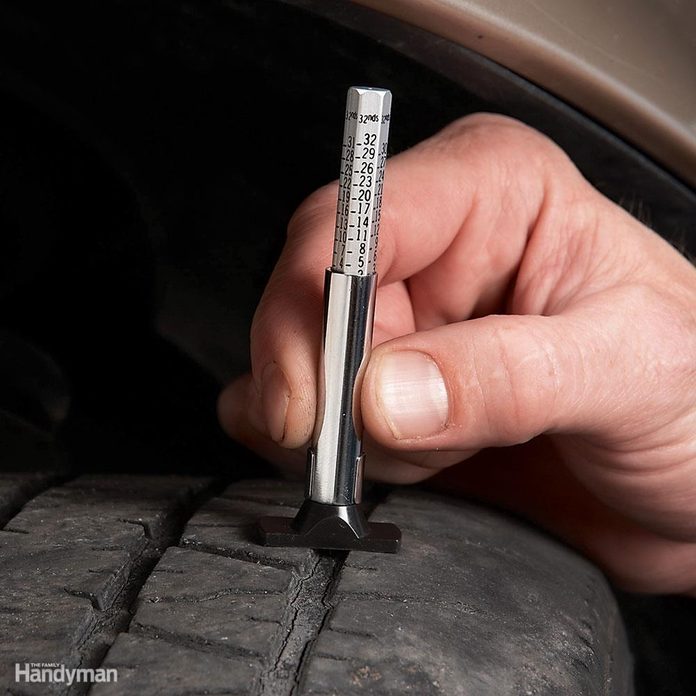
Check Tire Tread
Worn tires and winter driving create a particularly dangerous combination. They increase your stopping distance and decrease stability on wet roads. Even though most states have a 2/32-inch minimum tread depth standard, independent tests have shown that tire traction decreases dramatically once your tires wear beyond 4/32-inch.
You can try to slide by through winter on low tread, but that’s exactly what you’ll be doing — sliding. A single skid into the curb at five MPH can easily cause $1,500 worth of damage to suspension and steering components. Sure, insurance covers it. But you’ll have to pay the deductible, and it counts as an at-fault accident, raising your premiums for years.
For about the cost of a single deductible, you can buy new tires or install snow tires to avoid those slip-and-slide accidents. To check the depth of your tread, use an inexpensive tire tread depth gauge. Check the tread depth at the center and outer edges of each tire.
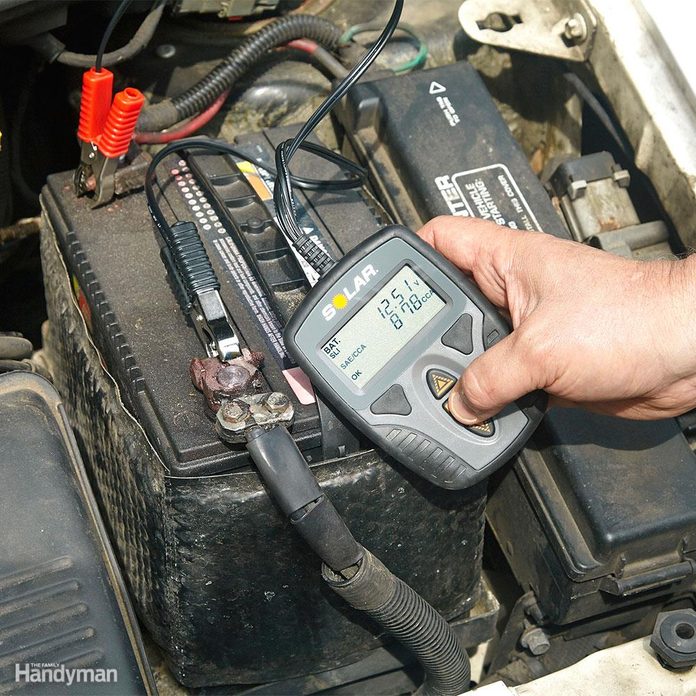
Test Your Car Battery
Car batteries have a limited life. Don’t wait for yours to fail and leave you stranded. With a computerized battery tester, you can check the condition of the car battery, starter and entire charging system.
Besides testing voltage, a computerized battery tester checks for internal resistance and conductance, giving you a good idea of the battery’s overall condition. Plus, the tester also checks the condition of your starter and alternator.
Make sure you buy a battery tester that works on conventional lead-acid batteries, as well as gel and absorbed glass mat (AGM) styles. That way you can use the same tester on your motorcycle and lawn and garden equipment.
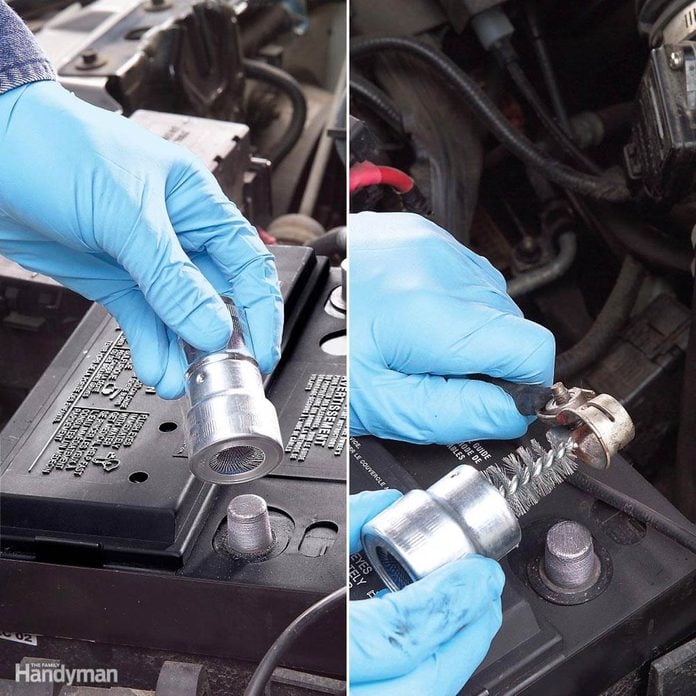
Clean Battery Terminals
Corrosion buildup on battery posts and terminals can cause hard starting problems in cold weather and prevent your charging system from recharging your battery. Cleaning them is an auto maintenance task that most drivers forget to do, and it’s an important way to winterize your car.
Disconnect the negative cable first, then the positive cable. Clean the battery terminals using a battery cleaning tool or wire brush, then clean the cable terminals. Clean off all grease and acid residue from the top of the battery with a paper towel. Once everything is clean, re-install the positive cable terminal, followed by the negative cable.
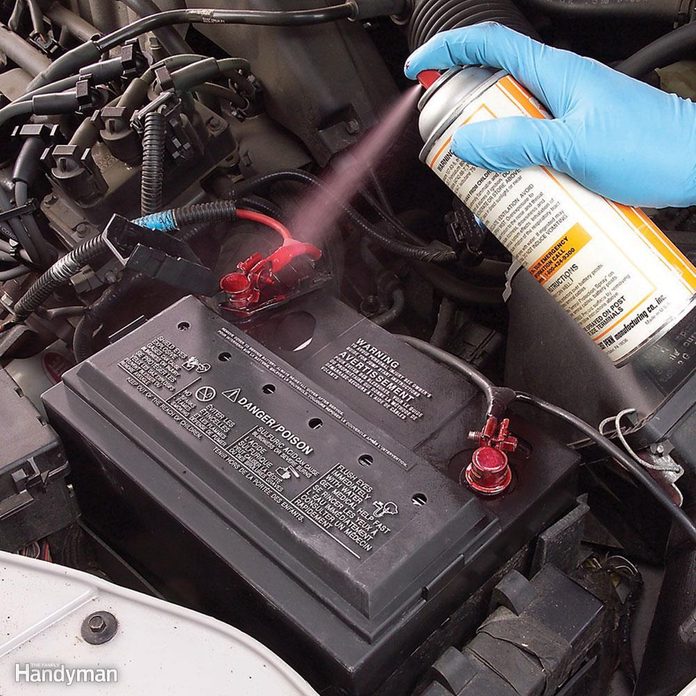
Protect Your Battery Terminals
Reduce future battery terminal corrosion with a battery terminal protectant spray. Once the battery terminals are cleaned and re-installed, spray each terminal with a liberal coating of battery terminal protectant spray.
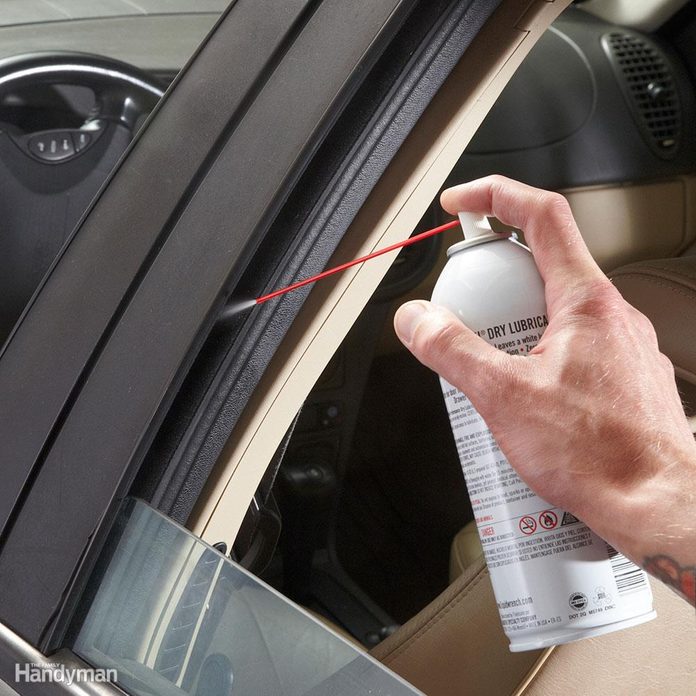
Lubricate Window Tracks
Freezing water can seep into the window tracks and create drag when you try to open the window. That drag can damage the window regulator cables, costing you hundreds of dollars. You can avoid the problem entirely by lubricating the window tracks with spray silicone or dry teflon spray lubricant.
Lower the window and shoot the spray right into the front and back window track. Apply enough lube so it drips all the way down the track. Then, operate the window through several open and close cycles to spread the lube along the entire track. Use glass cleaner and a paper towel to remove any spray that lands on the glass.

Lube Weather Stripping
If water seeps between your door and weather stripping and freezes, you could be frozen out of your car or truck. Prevent this by coating the weather stripping and the mating door surfaces with spray silicone. To avoid spraying silicone into your car’s interior, spray it directly onto a clean rag. Wipe the silicone lube onto your door and trunk weatherstripping. Repeat the procedure on door mating surfaces and the trunk lid.
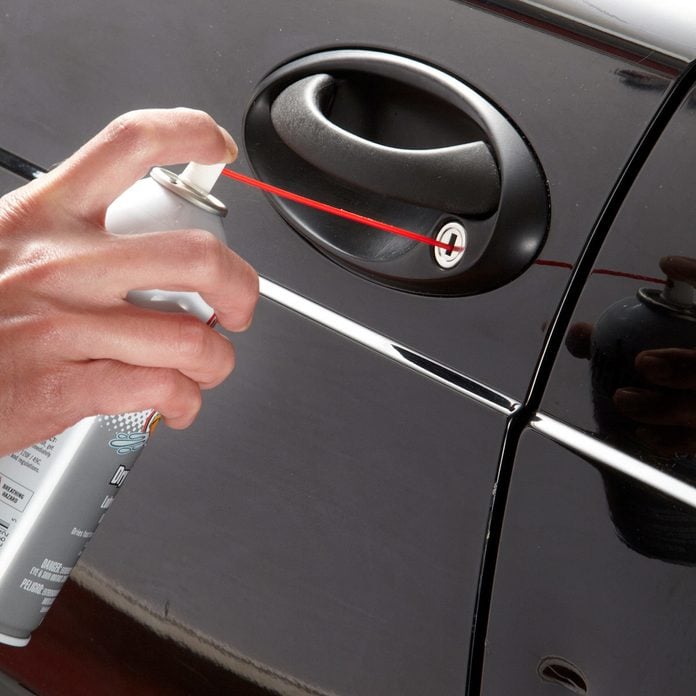
Lube Your Door Locks
You probably don’t use your door and trunk locks much if you have remote keyless entry, but that’s no reason to ignore them. If you don’t keep the lock cylinders lubricated, they’ll corrode, making it impossible for you to use your key. If your key fob battery ever dies, you’ll be locked out and have to call a locksmith.
Lubricating door and trunk lock cylinders is easy. Putting graphite lock lubricant into the keyway works well as long as you don’t overdo it.
Dry Teflon spray lube is another option. Shake the spray can to distribute the Teflon and shoot the liquid into the lock cylinder. The solvent will dissolve any sticky parts. Once the solvent evaporates, the internal lock parts will be coated in Teflon particles, allowing the lock to operate smoothly.
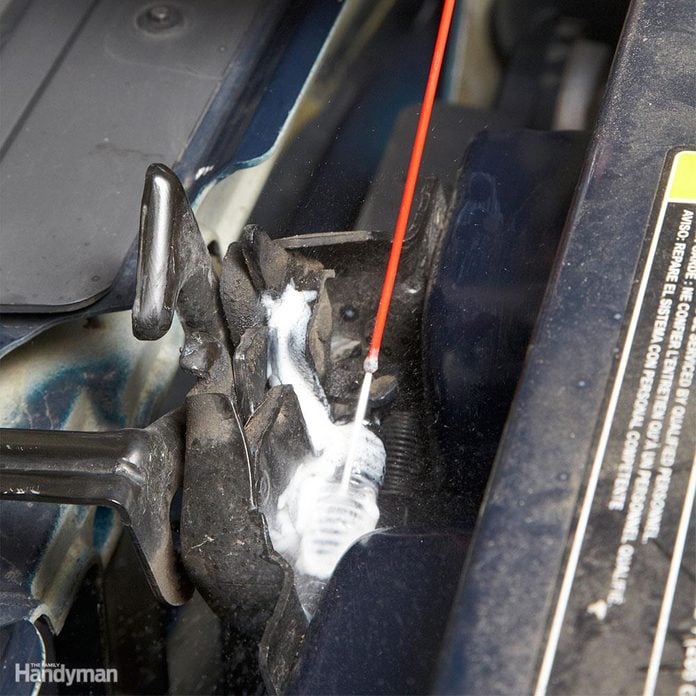
Lube Latches and Hinges
When your car won’t start, a sticking hood latch compounds your misery. Since the latch mechanism sits right behind the grille, it tends to corrode and seize from all the salt spray kicked up by the cars driving in front of you. You can prevent that corrosion by lubricating the latch mechanism before the snow flies.
Just pop the hood and soak the latch with spray lithium grease. Open and close the hood a few times to work the lube into the latch and spring mechanism. Then close the hood and forget about it for the rest of the winter. It’ll pop open without any problems when you need to get under the hood.
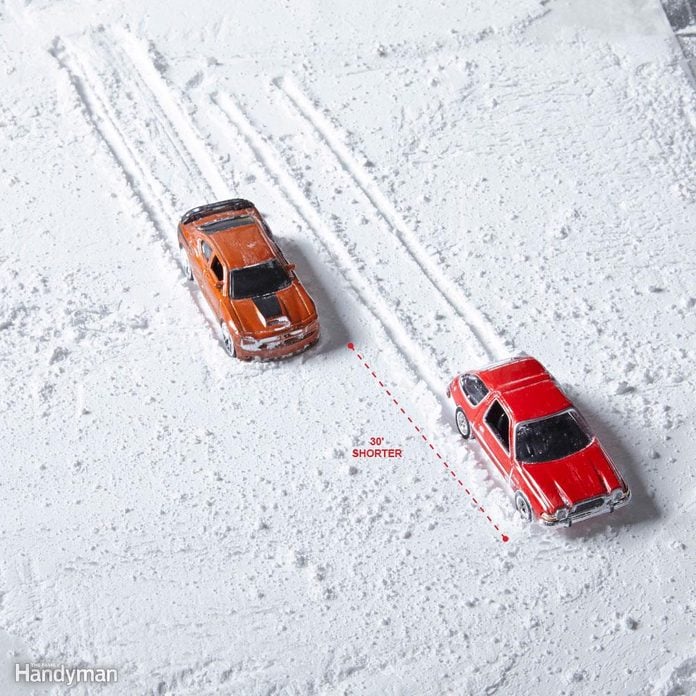
Consider Winter Tires
Winter tires could save your life. Winter tires, also known as snow tires because of the snowflake on their sidewall, provide much more traction on snow. “Winter tires make all the difference in the world,” says Gelfand. “They can enhance traction by about 30% for acceleration and can shorten your braking distance by around 40% shorter on average in icy or snowy conditions.”
A set of four winter tires costs $600 or more, depending on your wheel size. If you have the tires mounted on your existing wheels, you’ll have to pay a shop to swap them each spring and fall. Sure, winter tires cost a lot. But consider what you get for your money.
With better stopping distance and handling in turns, winter tires can prevent a potential at-fault accident. If your collision deductible sits in the $500 to $1,000 range, winter tires could actually pay for themselves in a single season if they keep you out of an accident.
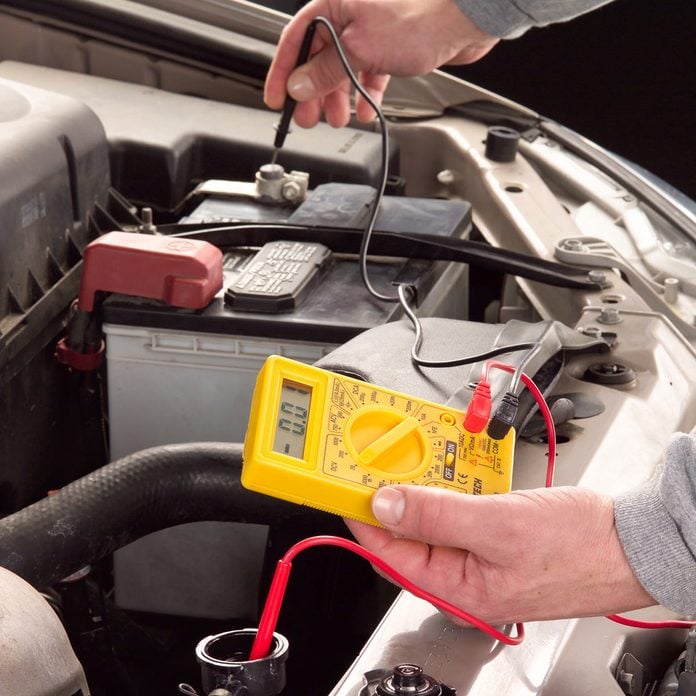
Check Your Coolant
Engine coolant does more than protect your engine from freezing and cracking. Coolant also contains anti-corrosive additives and water-pump lubricants to keep your entire cooling system in tip-top shape, so checking it — and changing it if necessary — is another important way to winterize your car.
Test the level of your coolant’s freeze protection using an inexpensive tester. Suck in some coolant from the coolant reservoir and read the results on the scale printed on the tester.
But don’t stop there. Just because coolant tests OK for freeze protection doesn’t mean the additives still provide protection. To check that, you’ll need to grab a digital multimeter and follow these steps:
- Begin with a cold engine. Remove the radiator cap and start the engine.
- Set your digital multimeter to DC volts at 20 volts or less. When the engine reaches operating temperature, insert the positive probe directly into the coolant.
- Rev the engine to 2,000 rpm and place the negative probe on the negative battery terminal.
- If the digital meter reads .4 volts or less, your coolant is in good condition.
- A reading greater than .4 volts shows the additives are exhausted, and you may be in the market for a new radiator, a water pump or a heater core. All of those repairs cost far more than a simple coolant change.
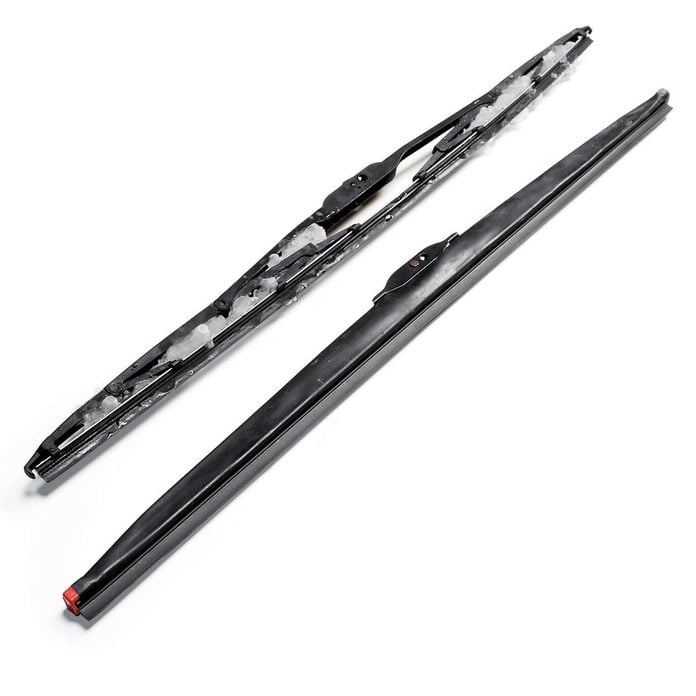
Switch to Winter Wiper Blades
Ordinary wiper blades get packed with snow, causing the blade to streak or miss large swaths of your windshield. Winter wiper blades eliminate that problem. A rubber boot encloses the entire blade, preventing ice and snow from sticking or packing. They make for much better visibility and safer winter driving. Remove your old wiper blades and store for use again next spring. Then snap on the winter wiper blades and see clearly all winter.
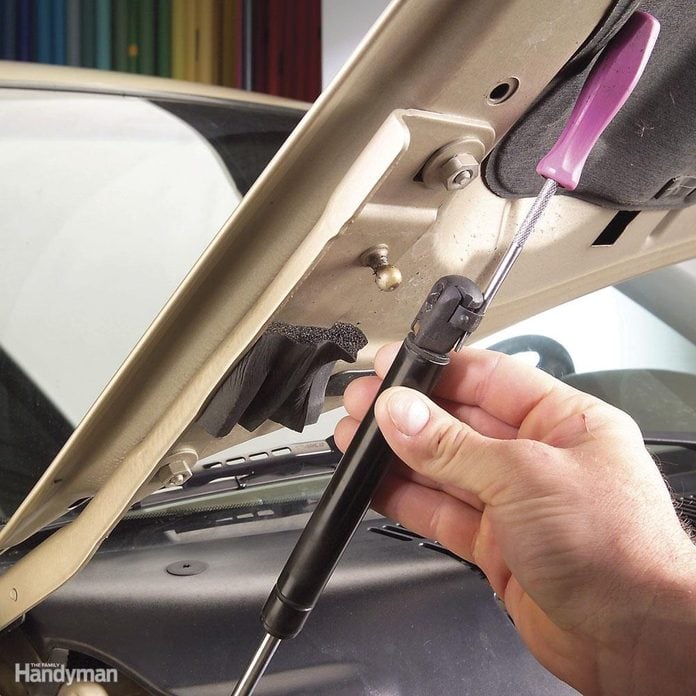
Check and Replace Your Hood Lifts
If the gas lift cylinders that keep your hood open struggle when it’s warm outside, they’ll quit working completely when temperatures dip below freezing. Because the left and the right lifts receive the same amount of wear, you should always replace them in pairs. Right and left-side lifts often differ in subtle ways, so ask the store clerk to label them for you.
Get a friend to hold the hood open while you replace the lift. Propping the hood with a piece of wood is a recipe for a head injury. The lifts attach to the hood and fender with bolts or a ball-and-socket arrangement.
The bolt styles make for an easy swap. Just remove the bolts and replace the lift. The ball-and-socket styles have a C-shaped clip that prevents the socket from popping off the ball. To remove the ends from the ball studs, just insert a small flat-blade screwdriver into the center of the clip to pry it out. That allows you to disengage the ball and socket.
Use the screwdriver to pry out the C-clip on the replacement lift and snap the end onto the ball.

Replace the Cabin Air Filter
Cabin air filters often get neglected on late-model cars and trucks. You may not consider this important maintenance, but a clogged cabin air filter can dramatically reduce airflow through your car’s heater, stressing the blower motor and overheating the blower motor resistor.
Blower motor replacement on some cars can cost as much as $400, so it really pays to replace your cabin air filter before the heating and cooling season. Buy a replacement filter at any auto parts store for less than $20 and refer to the installation instructions shown in your owner’s manual. Keep in mind that some models specify airflow direction, so note the orientation of the old filter as you slide it out.
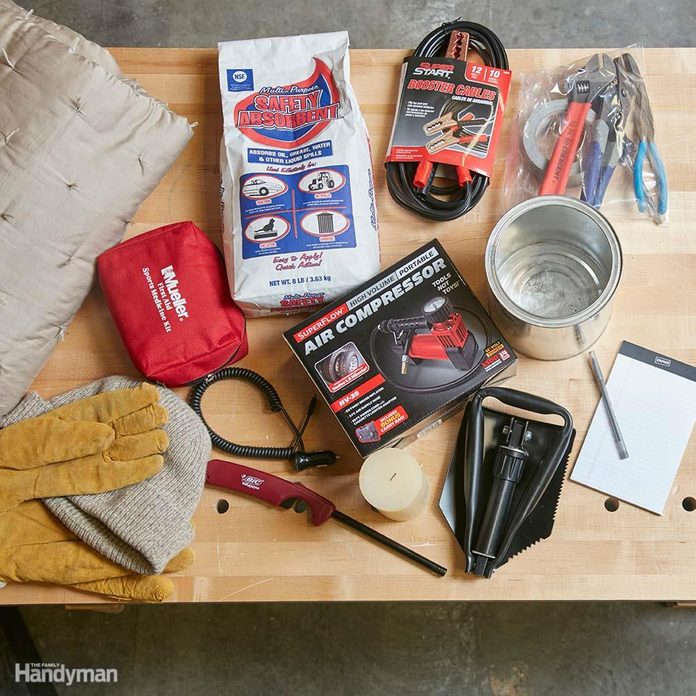
Assemble A Winter Survival Kit
You probably already have a few of the items in this winter car survival kit in your garage. However, they and a few other things belong in the car! Just put them together in a box and place it in your car during the winter months for roadside emergencies.
If you are properly equipped, you will be able to cope with most winter roadside breakdowns and avoid getting frostbite. For those of you who live or drive through rural, sparsely populated areas, being stuck in a blizzard can be an incredibly dangerous scenario if you’re not prepar. Here are the essential items your winter car survival kit should include:
- A candle-powered heater;
- A flashlight;
- A cellphone charger;
- A notepad and pen/pencil;
- A compact tire inflator;
- A small tool kit (screwdrivers, pliers, an adjustable wrench, duct tape, zip ties);
- A bag of cat litter or floor sweep absorbent to help regain traction on ice;
- Jumper cables;
- A small shovel;
- A can of Fix-A-Flat;
- A basic first aid kit;
- Warm gloves, hat, and blanket.
FAQ
When should I winterize my car?
Don’t wait until the freeze sets in. The best time to winterize your car is in the mid to late fall, before the snow starts to fly.
About the Expert
- Alan “Ollie” Gelfand is the owner of German Car Depot in Hollywood FL, an independent automotive service center specializing in the service and repair of German vehicles.



















